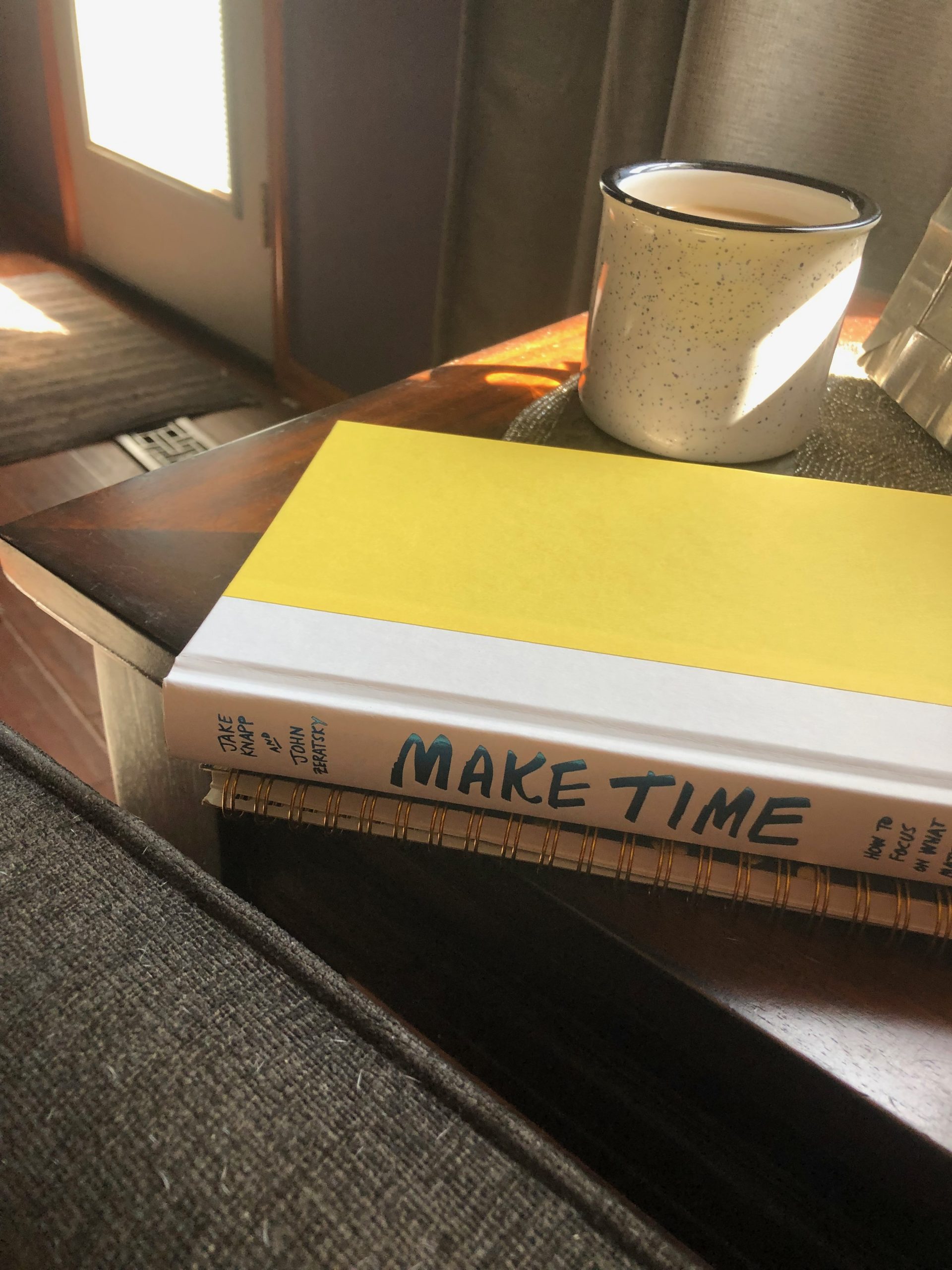I picked up my phone three times and received four app alerts in the short time that I spent taking notes for this post. Those distractions made the reading and notetaking for this post take probably twice as long as it should have, delaying other tasks I need to get done for the day. Oh, the irony.
I’m reading a book called Make Time: How to Focus on What Matters Every Day by Jake Knapp and John Zeratsky. So far the book has made me think that productivity methods vary as much as people, until I got to the chapter on laser focus.

Knapp and Zeratsky encourage readers to choose a highlight each day, one thing you must accomplish to move your goals forward, or create happiness or satisfaction. The next step after choosing your highlight is to become laser focused on that thing. Of course, distraction is the enemy of laser focus. And it was on the subject of distraction that Knapp and Zeratsky really caught my attention.
Knapp worked at Google and Zeratsky at YouTube. They’ve got solid insider knowledge on how tech companies strive to distract us from our highlights, focusing our attention on their products and, therefore, making money. The authors call these distracting apps, “Infinity Pools.” An Infinity Pool is anything with an infinite supply of interesting content. The biggest culprit of distraction is our phones. People spend an average of four hours a day on their phones, according to Knapp and Zeratsky. We touch our phones an average of 2,617 times a day and unlock them 80 to 110 times a day, according to a King University article on Cell Phone Addiction. We’re basically using our phones once every 10 minutes.
Our devices are killing our focus. The key to laser focus is to avoid distractions by creating barriers that make it more difficult for you to automatically react, according to Knapp and Zeratsky. Using these distraction-blocking methods for just a few days will help you feel more focused, less overwhelmed, more in control. You’ll also spend higher quality time on what’s important to you without the need to constantly refocus.
It takes about 23 minutes to resume a flow state after a distraction. Flow is the state in which you’re so involved in an activity that nothing else seems to matter, according to Mihaly Csikszentmihalyi, the psychologist who discovered the concept.
As a writer, professor and researcher, I understand the importance and wonder of being in a flow state. I assume you do too. As a distracted human, I understand the FOMO that occurs when you think everyone else is online chatting and responding to your posts while you’re doing other things. Confession: I’m having it right now. It’s taking great willpower not to pick up my iPhone, which is right in front of me on the desk. I also just realized that I have seven unopened emails showing on my computer. Ohhhh… the humanity!
It’s time for us to take control! Knapp and Zeratsky attracted my attention with their writing on how to be the boss of you phone. It’s advice that I know I need to follow, and I’ll bet most of you do too. Here it is.

Try a distraction-free phone
You can create a distraction-free phone by removing Infinity Pool apps. To do this:
- Delete social apps
- Delete other Infinity Pools
- Remove the web browser
- Keep everything else
It sounds terrifying, right? I’ve previously heard this process called “making your smartphone dumb.” Knapp and Zeratsky swear that having a smartphone is still worthwhile because of things like maps and podcasts. Plus, you can reinstall anything you really need to use. The idea behind this practice is that you’re controlling your phone instead of it controlling you.
Log out
Typing in your username and password is a hassle. Requiring yourself to do so makes you less likely to visit sites out of habit.
Nix notifications
Remember what I said above about those phone alerts while I was reading and the seven emails I can see waiting for me now? Notifications are non-stop attention thieves. Knapp and Zeratsky encourage readers to eliminate them. Here’s how:
- Go into your phone’s settings to the notifications list and turn each one off.
- Leave only useful notifications like calendar reminders and text messages.
- Turn off email and IM notifications.
- Don’t allow new apps to send notifications.
- Give it 48 hours to a week and see how you feel.
Clear your homescreen
Having a blank homescreen on your phone takes away the automatic speed of clicking on distracting apps, causing you to pause and consider the distraction each time you use your phone, according to Knapp and Zeratsky.
Wear a watch
This keeps you from picking up your phone to look at the time and becoming distracted, according to Knapp and Zeratsky. They obviously don’t have Apple Watches.
Leave devices behind
Don’t take your laptop and phone with you when you leave the office for the day or leave them in another room. I love this advice. I find that I have some of the most fulfilling, relaxing evenings with my family when I leave my phone on the charger in another room or I’m in the pool and it’s inside.
Skip the morning check-in
We all do this in the morning. Our phone is our alarm clock, so we pick it up, turn off the alarm and begin going through our apps in a habitual order. Depending on how badly we’re trying to avoid getting out of bed, we may cycle through them several times.
Checking our phones in the morning starts our day with an attention tug-of-war, according to Knapp and Zeratsky. We need to stop.
Block your favorite distraction
Log out of or remove whatever app distracts you the most, the one where you spend the most time. I would tell you that my favorite app is Twitter. However, my iPhone’s screen time report tells me I spend the most time every week on Facebook. So, according to Knapp and Zeratsky’s advice, I need to remove Facebook from my phone.
Put your toys away
At the end of the work day, clear your computer screen and close all of the programs and browsers. This will help you be focused on your first task when you arrive the next morning, not distracted by what you were doing the day before.
Fly without Wi-Fi
I used to travel internationally for work. It was interesting to me that, the longer I traveled, the more difficult it was for me when I was on a plane without Wi-Fi. I would get a nervous feeling when I couldn’t use my phone. Addiction, much?
The great thing about being on a plane is that what’s done when you board is what’s going to be done. You can’t handle any outside issues until you land. This makes it the perfect distraction-free zone to do deep work. Give it a try!
Put a timer on the Internet
Turn off the internet, put a vacation timer on it or use an Internet blocking app while you write.
While I’ve heard good things about Internet blocking apps, I’ve already grabbed one book, looked at my phone for the answer to a question and looked online for four or five different resources while I was writing this post. When I’m writing research, I often need to visit the online library to look things up. So, don’t hamper your productivity with these apps.
Cancel the Internet
I actually love this idea, but I’m sure my husband and teenage son would revolt. Canceling the Internet at home will help you save money and avoid distractions. If you really need to get online, you can always use your phone’s hot spot.
Watch small distractions
Small distractions, what Knapp and Zeratsky call “time craters” can really add up fast. For example, one tweet can end up costing you 30 minutes in writing it, checking back in and responding to others. Think about the little things you do that cause chain reactions of distraction.
Trade fake wins for real ones
Social updates are what Knapp and Zeratsky call “fake wins” because they make you feel like you’re working or accomplishing things when they really just take time away from your day’s most important task.
Turn distractions into tools
Focus on every app’s purpose. Why did you start using it in the first place? Then put that into context and set boundaries around it.
For example, I started using Facebook to connect with friends and family who don’t live nearby and keep them updated on my kids’ lives. Now I use it like nine hours a week. I could call those family members and have conversations with them in less time. I’ve moved away from the original purpose of Facebook for me, and I need to get control of the distraction.
Some of Knapp and Zeratsky’s tips sound pretty scary, at least they do to me. I also can see how all of the ones I listed here (not a comprehensive list from the book) could easily help to gain some control of distractions. Let’s try some of them for a week or month and see what happens! Let me know how it goes.



